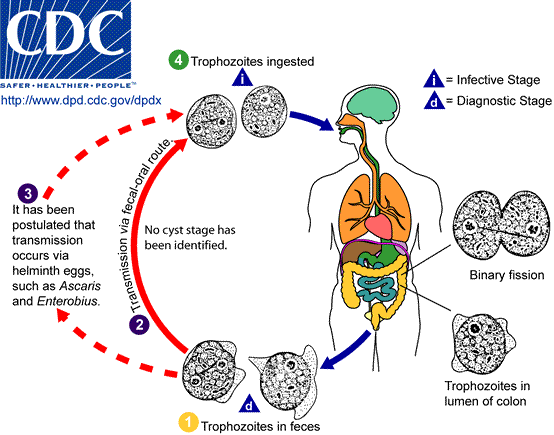Dientamoeba fragilis is a parasite that lives in the large intestine of humans. Infection is common worldwide, including in the United States.
Many infected people do not have any symptoms. The most common symptoms are diarrhea and abdominal pain. Loss of appetite and weight loss, nausea, and fatigue also are common. The infection does not spread from the intestine to other parts of the body.
See your health care provider.
Your health care provider will ask you to provide stool samples for testing. Because the parasite is not always found in every stool sample, you might be asked to submit stool samples from more than one day. You might also be tested for pinworm eggs, which are commonly (but not always) found in persons infected with D. fragilis.
Yes. Safe and effective medications are available for D. fragilis infections.
This question is difficult to answer because we aren't sure how D. fragilis is spread. The parasite is fragile and probably cannot live very long in the environment. Infection might be spread by:
Anyone can become infected with this parasite. However, the risk for infection might be higher for people who have weak immune systems and those who live in or travel to settings with poor sanitary conditions.
Despite its name, Dientamoeba fragilis is not an ameba but a flagellate. This protozoan parasite produces trophozoites; cysts have not been identified. Infection may be either symptomatic or asymptomatic.

The complete life cycle of this parasite has not yet been determined, but assumptions were made based on clinical data. To date, the cyst stage has not been identified in D. fragilis life cycle, and the trophozoite is the only stage found in stools of infected individuals. D. fragilis is probably transmitted by fecal-oral route.The and transmission via helminth eggs (e.g., Ascaris, Entamoeba spp has been postulated. Trophozoites of D. fragilis have characteristically one or two nuclei and it is found in children complaining of intestinal (e.g., intermittent diarrhea, abdominal pain) and other symptoms (e.g., nausea, anorexia, fatigue, malaise, poor weight gain).
Life cycle image and information courtesy of DPDx.
For more information view the source:Center for Disease Control
Recommended Test: Full GI Panel
Recommended Product: Freedom Cleanse Restore Parasite Cleanse